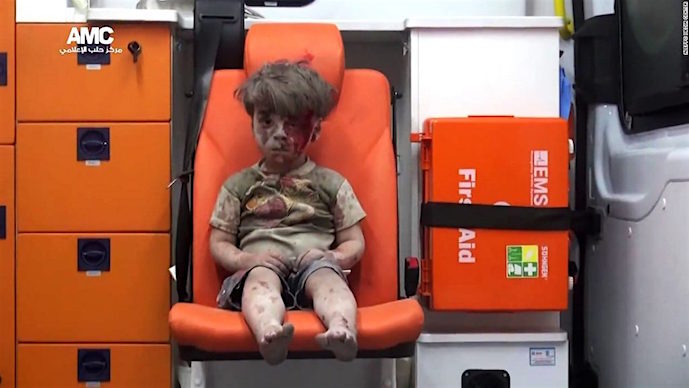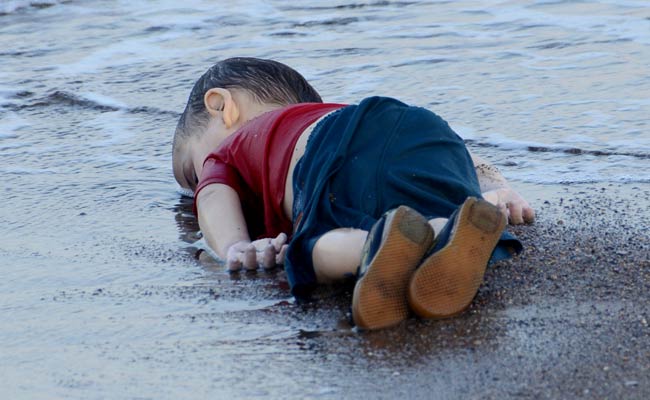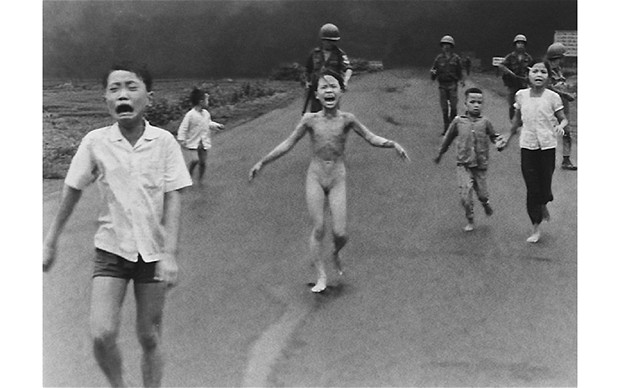-
24/08/2016
-
Ad astra
-
asylum seekers

As you sit on your comfortable chair after a satisfying meal with a glass of your favourite drink in hand and view current affairs programmes on TV, do you reflect on the plethora of distressing images that assail viewers day after day? Do you ponder how you might feel if you were part of those images?
How did you feel when you saw the stunned, blackened, bloodied face of five-year-old Omran Daqneesh, sitting in an ambulance after being dragged from the rubble after another air attack on Aleppo? Did it bring back memories of Alan Kurdi, a three-year-old Syrian boy of Kurdish background drowned on a beach near the Turkish resort of Bodrum in September last year during his parents’ attempt to escape Syria for the Greek island of Kos. This image shocked the world, yet here we are a year later shocked again by the same conflict and the same awful outcomes for children. Now we hear that Omran’s ten-year-old brother Ali died in the same attack.

These images reminded us of a photo of a small, naked nine-year-old Vietnamese girl, Phan Th? Kim Phúc, also known as 'Napalm Girl' running away from a napalm raid on her village. The photograph is one of the most memorable of the 20th century. It may have changed attitudes to the Vietnam conflict, highlighting as it did the tragic legacy of war, but here we are again reliving the tragedies all over again, tragedies that afflict little children, innocents who suffer because of where they live, whose lives are forever scarred. These children have known nothing but war.

When you wake in the morning, do you ever ask: ‘What am I going to do today?” For older folk, now in retirement, this may be a regular question. Can you imagine what the answer might be if you were living in the rubble of Aleppo or any of hundreds of places ravished by war day after day? Can you picture what your answer might be if you were living in an overcrowded refugee camp in Turkey just over the border from Syria. The most likely answer might be simply ‘survival’, survival for another day – finding enough food, water and shelter for yourself and your family to keep body and soul together. What might your answer be if you were confined to Manus Island or Nauru, with virtually no prospect of ever settling where normal family life might be resumed?
As we enjoy our comfortable lives, how can we imagine what it must be like to suffer the torment, the danger, the uncertainty, the boredom and the endless weariness of living in limbo?
We struggle to contemplate these never-ending agonies, and feel helpless as we reflect on whether we can ever make a difference for those who live with this daily suffering. It is distressing even to think about it.
For these unfortunate people, what is the meaning of life?
When survival is their prime endeavour, how can they anticipate a secure life, a rewarding existence, and a healthy future?
Most who read this piece will have had a satisfying life. Not perfect, not lavish, not entirely free of stress, worry and ill health, but agreeable enough in this land of ours so gifted with natural resources and opportunity. Most will feel fulfilled, will feel that they have made a contribution to our multicultural society. Not all – there are always the disadvantaged, the sick, the disabled, the poor, the homeless, those who have been dealt a poor hand in the game of life. Our society recognizes these inequities and makes provision for some of them.
Most who live in this richly endowed country are likely to feel that they have been able to make a contribution to society and, to use a hackneyed phrase, will ‘leave it in better shape’. For some this has been relatively easy. Teachers, doctors, health care workers, neighbourhood workers, firefighters and police officers go to work each day feeling that what they do is valuable, indeed essential for the wellbeing of the community. Likewise, mothers know that giving life to children is crucial to the vitality of our community. Raising and nurturing a family gives meaning to life for parents around the world. Some find meaning in life by adherence to religion, or through support for charitable organizations. Some join movements protesting against injustice.
There are of course many other ways that we contribute, whether through manufacturing, commerce, industry, public service, the armed forces, or the myriad of services the community wants and needs. Some may feel that their occupation is humdrum and their contribution insignificant, but most can enjoy the satisfaction of doing something for others. For most in this lucky country, although sadly not all, there is meaning to life, and satisfaction with a life well lived.
But this does not relieve us from being concerned about those less well off, about the inequality that afflicts our Australian society, about those whom we as a nation treat poorly, or inhospitably, or cruelly, or indifferently.
How can we watch the images of war: destruction, displacement, despair and death, even of precious children, and not want to do something? All except those who have built a wall of indifference around them feel the anguish of conflict, dislocation, poverty, injustice, unfairness and inequality. Yet we so often feel powerless to effect any change. Too often, we lack the means. While life might be meaningful for us, we know it is not for so many others. How can we make a difference in the lives of the less fortunate? How can we help them to find meaning where there is so little?
The answer seems to rest largely with those whom we elect to represent us. Individually, we are unable to stop conflict, eliminate war, remedy the displacement of many millions around the world, and relieve the poverty, the injustice and the inequalities that afflict so many. But we do have our politicians and the public service that supports them.
Of all our citizens, politicians have more power than any of us to effect change. Politicians are able to assess the state of our world and our nation, to identify our problems, to evaluate our advantages, to take stock of our resources, to arrive at equitable solutions, and to put them into place. We elect them to do this. We want them to enact laws that give meaning to people’s lives, laws that give a helping hand to those who need it, that smooth out social inequities, that increase the prosperity of our nation and all who live in it, that enable all of us to make the most of our lives, to enjoy meaningful lives that enrich not just ourselves, but all those with whom we have contact.
Moreover, we want our politicians to reach out to those outside our country, to use their influence to lessen tensions, conflict and war. We want them to bring peace to our troubled world. And while they are doing so, we want them to give succour to the displaced, to the families and the children ravaged by conflict, destruction and death, to give them the opportunity of a meaningful life.
I know it reads like an impossible dream. Sadly we not only seem to be far from realizing the dream; we seem to be making the nightmare worse.
I could write reams about the inadequacies, the indifference and sheer incompetence of our federal government, but I need go no further than ask why our offshore detention arrangements continue to persecute the innocent – the men, women and children that languish without hope on Nauru and Manus Island. How in earth has it come to this?
We know the history pretty well. Look behind it though and we see the real reasons. John Howard saw a political advantage in opposing asylum seekers coming by boat. The ‘Tampa affair’, the ‘children overboard’ saga, and his words, indelibly written into our history;
“We will decide who comes to this country and the circumstances in which they come”, all reinforced a view that these people were unwelcome intruders. Tony Abbott, never to miss a chance to wedge his opponents, ramped up the anti-asylum seeker rhetoric, demonized boat people, stirred up enmity, even hatred among some in marginal electorates, and used the slogan ‘Stop the Boats’ to successfully wedge his opponents. His hyper-partisan approach to boat arrivals set a pattern that exists to this day.
Labor became caught up in an unseemly race to the bottom; inhumanity, cruelty and hopelessness became the norm for boat people. It persists still. Scott Morrison and Peter Dutton became loyal foot soldiers for Abbott and his conservative admirers, and now for Turnbull, who despite his own feelings, has been dragooned into taking the same punitive, unyielding, unsympathetic, mean approach of his predecessor, all in pursuit of the spurious objective of ‘protecting our borders’ from what is represented as some sort of invasion. The truth is that he is protecting his back from the knives of Abbott’s conservatives.
Our federal government seems hell-bent on depriving those on Manus and Nauru of any real meaning in their lives. Every morning, as they ask what they are going to do today, the answer is the same – survive another day. They dare not hope for any improvement in their situation. And in addition to their overwhelming feelings of hopelessness and despair, they now suffer assaults, sexual abuse, rape, child abuse, and discrimination, about which reports Dutton is skeptical and indifferent.
What has our country come to? Our reputation as a decent people is tarnished daily. We are held up to the world community as cruel, indifferent to the norms of international behaviour towards asylum seekers, and thoroughly mean spirited. Is that the image we want?
So what is the answer? What can we do to change the state of the world, or closer to home the plight of asylum seekers in indefinite detention? How can we make life more meaningful for these almost-forgotten people? How can we enhance the meaning of life for ourselves?
The ballot box is one answer. But with both major parties using asylum seeker issues as a wedge, would a change of government make any difference, so entrenched in the electorate is the anti-asylum seeker feeling, now accentuated by Pauline Hanson’s One Nation Party?
There are protest movements: GetUp and 350.org are just two, but they are having little effect on the Turnbull government and its hardnosed Immigration Minister, the odious Dutton.
Blog sites and social media have a role to play; even writing something like this piece, and commenting on it, give a feeling of doing something, no matter how small.
We all seek meaning in our lives, but sadly many have few avenues of enriching it. Maybe contributing our small voices in this way is the best we can do to encourage, indeed pressure those whom we depend upon to speak out and act for us in this troubled world, to challenge, repudiate and defeat the alien forces we see operating around us everywhere, every day. But that would take fortitude and selflessness, rare attributes in today’s politicians, for whom self-interest prevails.
Oh for politicians of the calibre of William Wilberforce and Emmeline Pankhurst, whose courage, tenacity and unyielding persistence gave meaning to the lives of so many of the oppressed, so many of the disadvantaged!
Current rating: 0.3 / 5 | Rated 17 times